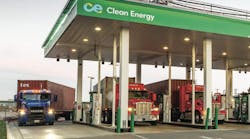With gasoline prices hovering at historically high levels, transit agencies are coping with two converging trends – fuel shortages and higher prices coupled to rising ridership as people ditch their vehicles in favor of less costly transportation.
The Southeastern Pennsylvania Transit Authority (SEPTA) said its ridership has grown by about 10,000 daily trips, with more riders anticipated. “As people see the price at the gas pump they are recognizing the increasing value of SEPTA,” said SEPTA general manager Faye Moore.
“We have seen a slight increase in riders on our commuter route,” Belinda Wilson, business manager for commuter-bus operator Lynx, Orlando’s tri-county transit agency, told the Daytona Beach News.
“The drawback is that the bus travels in the same traffic as the cars so it does not move any faster,” Lynx spokesman Brian Martin told the paper. “But, it does save money and aggravation from having to drive.” A one-way ticket is $2 and taking five round trips a week costs $20. The same trips in a new midsize car would cost more than $180, according to AAA, when taking into account costs for depreciation, financing, gas, maintenance, wear and tear, insurance and taxes.
Yet high prices and shortages are affecting transit agencies too – just as they are trying to deal with increased ridership.
“Fuel shortages are another area of concern expressed by some transit systems,” said William Millar, president of the American Public Transit Association. “The FTA (Federal Transit Agency) is working with its counterparts throughout the federal government to respond to these shortages that threaten operations.”
Millar said if a transit system is experiencing fuel shortages, they should contact their FTA regional office and provide them with specific details on your average daily consumption, fuel on hand, anticipated deliveries and the amount of time you can continue to operate. He also asked that they send this information to APTA, to the attention of Jim Olivetti at [email protected].
That being said, indications are that fuel prices should be leveling off – though at historically high prices – and shortages should subside.
According to the Automobile Club of Southern California, production problems at two Northern California refineries have reportedly been resolved, which should help put some downward pressure on local prices. But because of hurricane-related gas supply issues in other parts of the country, no big price decreases are expected soon in California, it said.
“As more refineries have resumed higher production levels, we’re seeing prices level off,” said Auto Club spokeswoman Carol Thorp. “However, it’s still too soon to say when and by how much prices will drop.”
“Consumers are paying a dollar more for a gallon of gasoline than what they paid only a year ago,” added Rose Rougeau, spokesperson for AAA Texas. “The recent price spikes following Hurricane Katrina were due to several refineries and oil pipelines in Louisiana and the Gulf Coast being shut down due to hurricane damage. However, we’ve seen prices begin to level out … so we may have seen the peak.”
To discuss the Katrina disaster and its effect on the trucking industry or share your experiences, please visit FleetOwner's Katrina Blog at blog.fleetowner.com/katrina.
To view the archive of FleetOwner’s ongoing Katrina news coverage, go to www.fleetowner.com/katrina.


